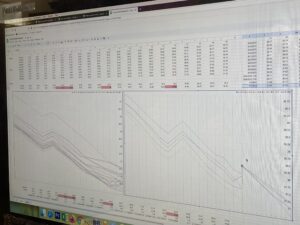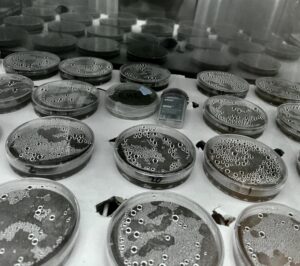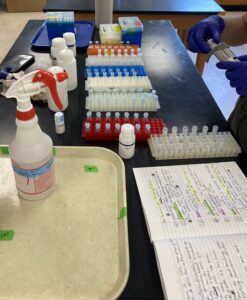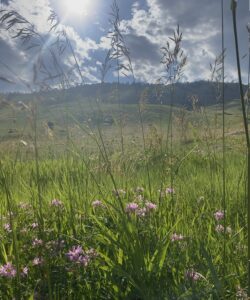Hello all! I’m excited to tell you about my first week at the Schmidt lab at UC Boulder. First, I’ll give a brief summary of the experiment which I a, helping with! My mentor, Steve Schmidt, wants to discern the limiting nutrient for cryoconite in Antarctic sediment holes. To do this, the lab has Antarctic sediment samples which they keep in artificially polar climates. The samples are “watered” and weighed to ensure proper moisture content, and certain samples are occasionally given solutions with nutrients such as carbon, nitrogen, and phosphorus. By comparing cryoconite growth in each sample, those at the lab hope to ascertain the limiting nutrient.
Monday was my first day, and it was pretty quiet. Many members were out of the lab because of the holiday, but I did get the chance to meet my mentor, Steve. I also met Melia, an undergraduate student working at the lab this summer. Both of them were kind enough to show me around the lab, where there are freezers filled to the brim with soil samples from all over the world, and cabinets lined with the assorted chemicals needed for experiments. I was introduced to sterile lab procedures using gloves, quatricide, and ethanol. Also,I got the opportunity to look at a sample under the microscope, but unfortunately there has been no growth yet, as the experiment is just only underway.
Tuesday was the Fourth, so I didn’t come in to the lab. I’ll talk more about my free time later on in this post.
On Wednesday, more people were in the lab. I saw Adam, whom I had previously met in Telluride during the SunSpears camp. He and Steve are both working on the Antarctic samples. Every two days the sample’s locations are randomized inside the freezer to decrease bias, and the samples are weighed to track water loss. Melia performed these procedures as I watched and recorded the weights.
Thursday was pretty busy! The morning began with some challenges regarding the watering of the samples. Melia and I struggled to come up with a mathematical procedure which would ensure that each sample would be hydrated to 80% of its full water-holding capacity. After more brainstorming with Steve and Adam, we decided to water all the samples to the same weight of 36.5 grams, which would approximately satisfy our desired saturation. As Melia watered each sample using sterilized water and a micropipette, I recorded the weights of each sample before and after the watering(since they usually ended a little above of below 36.5 grams). I also met Emily, a 2023 graduate who has worked in the lab for more than 2 years. In the afternoon, Melia and Emily worked to extract RNA from older samples using meticulous procedures. As I watched, I was introduced to equipment like the centrifuge and the Vortex.
Friday was short and sweet. Since we had just watered/weighed the samples, there wasn’t anything else to do with them, so Melia showed me how the lab ensures that the temperatures in the freezers stay consistent with a real-world climate: using a contraption which records light intensity and temperature, a graph is created, and we check for any abnormal spikes in either variable. This information is important to prove proper experimental execution when the results are shared.
In my free-time, I have been exploring all Boulder has to offer! I have been taking long walks through the city streets, and visiting small coffee shops and thrift stores. The area around my host family’s house has gorgeous trails, perfect for running in the evening. I took a wonderful class at the Boulder Ballet, and enjoyed a 4th of July performance by the Boulder Symphony.
Many thanks to Pinhead, my host family, and the Schmidt lab for such an amazing first week in Boulder— and thank you for following along!





There are no comments published yet.